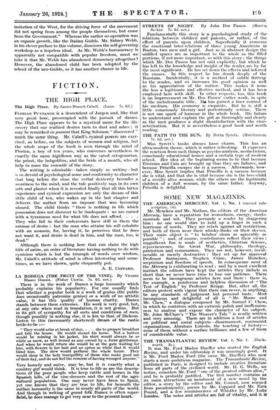FICTION.
THE HIGH PLACE.
The High Place. By James Branch Cabell. (Lane. 7s. 6d.) FLORIAN PUYSANGE is a descendant of Jurgen and, like that very great bore, preoccupied with the pursuit of dames. The High Place appears to be a mystical name for the dis- covery that our realized desires turn to dust and ashes ; it may be remarked en passant that King Solomon " discovered " much the same thing. Mr. Cabell's cynical powers are exer- cised, as before, on the subjects of women and religion, but the whole scope of the book is seen through the mind of Florian, a boy of ten years, who converses nevertheless in exactly the same highflown way as the sated octogenarian, the priest, the hobgoblins, and the bride of a month, who all help to mass the ensemble of the story.
The writing is admirable—taken simply as writing—but is so devoid of psychological sense and conformity to character that long before the close the verbal dexterity beconfes weariness to the mind, and the tale positively sags in its own lath and plaster when it is revealed finally that all this bitter experience and cynical expression are only the dream of this little child of ten, who wakes up in the last chapter and delivers the author from an impasse that was becoming absurd. The child thinks " there is nothing in life which possession does not discover to be inadequate : we are cursed with a tyrannous need for what life does not afford. . . . They who fail in their endeavours have still in them the animus of desire : but the man who attains his will cohabits with an assassin, for, having it, he perceives that he does not want it, and desire is dead in him, and the man, too, is dead."
Although there is nothing here that can claim the high title of satire, an order of literature having nothing to do with cynicism which is but the triumph of words over wisdom, Mr. Cabell's attitude of mind is often interesting and some- times, as we have shown, quite eloquently put.
A. E. COPPARD.


































 Previous page
Previous page